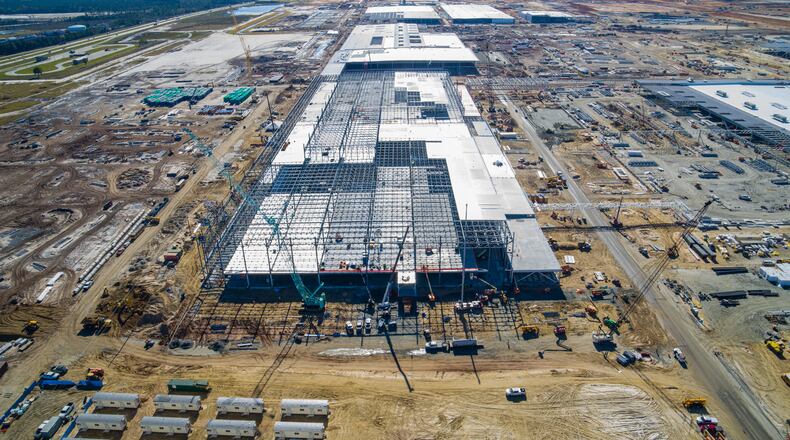Hyundai Motor Group leaders are re-evaluating whether its forthcoming $7.6 billion factory in Coastal Georgia should only produce electric vehicles or if its manufacturing lines should incorporate hybrid cars.
José Muñoz, Hyundai Motor Group’s North American chief executive, told CNBC on Wednesday that the Korean automaker is considering diversifying its manufacturing offerings at its future Metaplant in response to market trends. Sales of hybrid and plug-in hybrid cars are growing significantly as some consumers have shied away from buying fully electric vehicles.
EV sales are growing but demand lags industry expectations. The U.S. Environmental Protection Agency, meanwhile, recently revised emission rules that are not as strict as previous draft rules. The new rules will give automakers some flexibility with regard to electrification and favor plug-in hybrids rather than just incentivizing fully electric cars.
Credit: Hyundai Motor Group
Credit: Hyundai Motor Group
“We are now getting ready for a ramp-up on electric vehicles and then we are evaluating if we need to maybe add some additional technologies into the plan depending on the market evaluation,” Muñoz told CNBC at the New York International Auto Show.
A Hyundai spokesperson told The Atlanta Journal-Constitution that, “The Hyundai Motor Group is always evaluating various options to adapt to market and consumer demand.”
Plug-in hybrids offer electric-powered propulsion for short distances with a gas-powered engine for extended range.
This is not the first time Hyundai has considered building vehicles with internal combustion engines or hybrid powertrains at the Metaplant, which will produce Hyundai, Kia and Genesis models. Prior to announcing the factory in 2022, Hyundai officials considered vehicles with other drivetrains being built there.
Muñoz said Hyundai, which is the second-largest seller of EVs behind Tesla, is not strategically shifting gears away from fully electric cars. But he told CNBC “everything is on the table” as the company reacts to market forces that are controlling the long-term future of the automobile industry.
On Wednesday, the company revealed a refreshed Tuscon crossover that will include a conventional gas engine, as well as hybrid and plug-in hybrid EV versions.
“We’ve been one of the pioneers on (EVs) and I think we want to take advantage of that,” he said. “But hybrid is very important … our hybrid production is growing. There’s a high demand for it. So you’re going to see an increase in the mix of hybrids in Hyundai as well.”
Georgia has emerged as a national leader in the anticipated electrification of auto travel, with Hyundai as the state’s largest player. The company is investing $12.6 billion across the Peach State, including its Metaplant in Bryan County and a joint battery manufacturing facility with SK On in Bartow County. It’s subsidiary Kia, which currently operates Georgia’s sole auto manufacturing plant in West Point, is also incorporating EVs into its production lines.
According to the Georgia Department of Economic Development, the state has announced 53 EV and battery projects since 2018 that combine for $27.3 billion in investment and more than 32,000 anticipated jobs. This includes Rivian’s planned $5 billion EV factory an hour east of Atlanta, which has been indefinitely paused as the company shifts focus to becoming profitable. Cox Enterprises, owner of the AJC, owns about a 3% stake in Rivian.
Rivian has said its future Georgia factory remains a key part of its future, though a new construction timeline has not been announced.
Hyundai’s Metaplant is quickly rising in Bryan County and is on track to begin production in October, more than three months ahead of schedule. The company’s supplier network has also announced several nearby projects to provide parts to the factory, which is expected to output 300,000 EVs a year in its first phase. Once fully operational, the plant will employ an estimated 8,500 workers.
Muñoz told CNBC that hybrids are getting renewed focus from consumers, especially those hesitant to fully transition to electric. But he said it’s clear from consumer demand and government regulation that internal combustion engines are not the long-term future.
“We see a very clear path to electrification,” he said. “... I don’t think hybrid is going to be the only solution. We continue to bet on both: EVs and hybrids.”
About the Author
Keep Reading
The Latest
Featured




